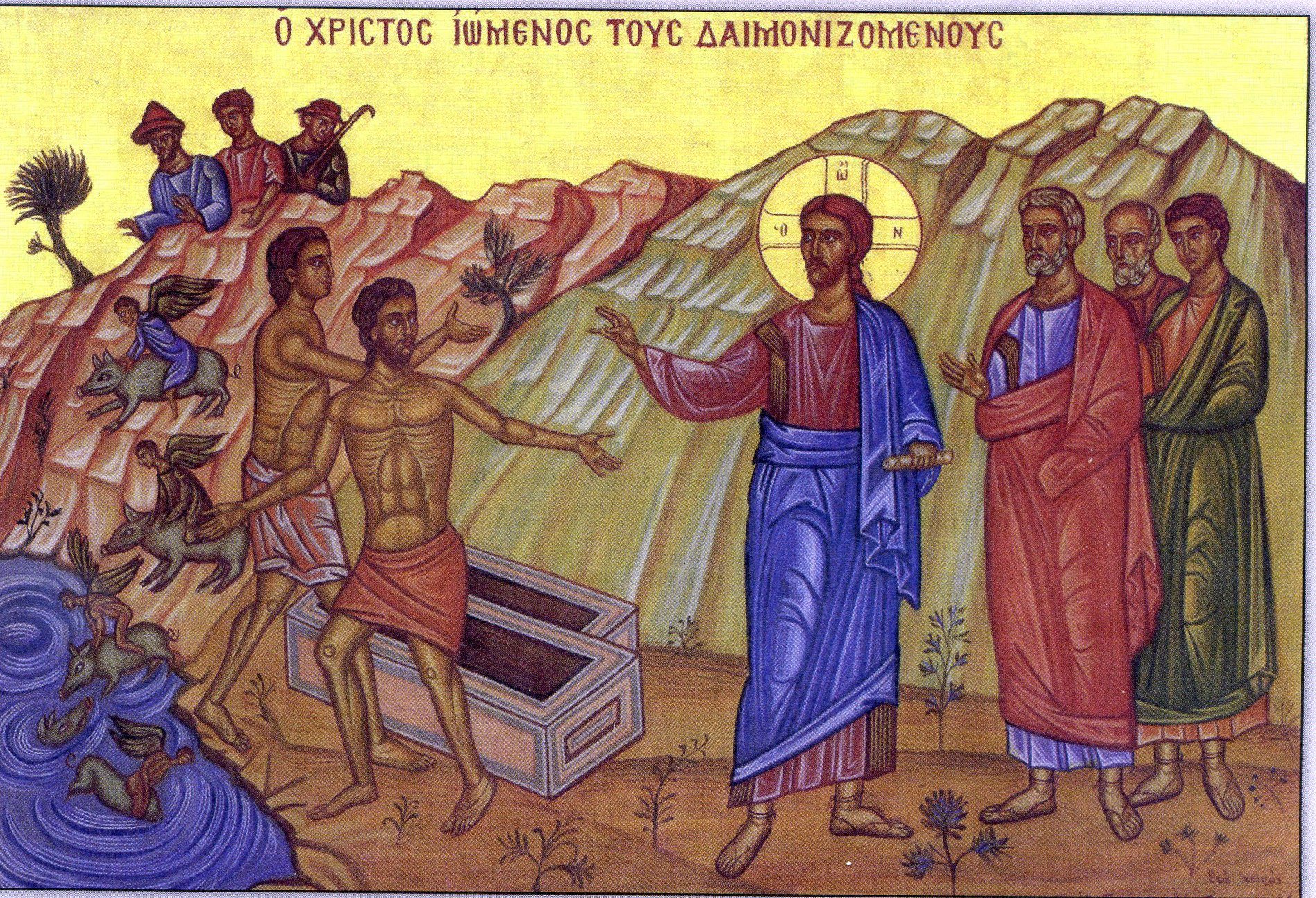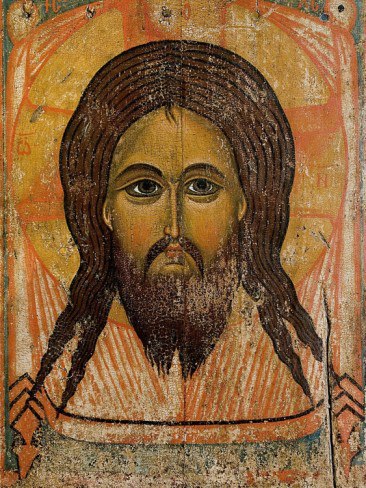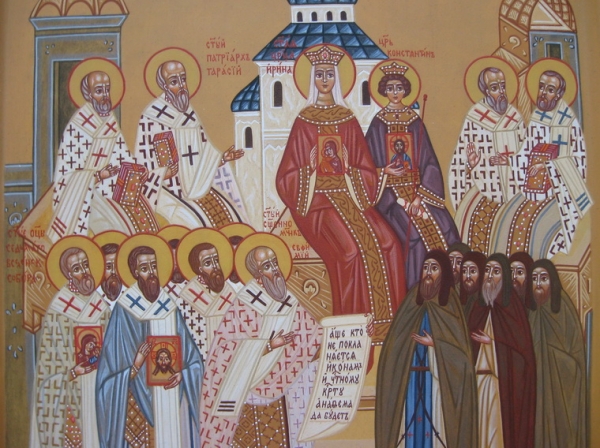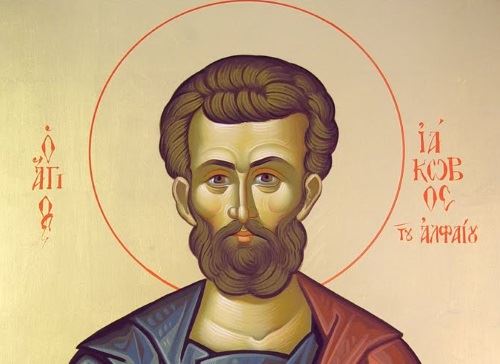The Papal prayer intention for November 2018:
That the language of love and dialogue may always prevail over the language of conflict.
Join in prayer with this intention in mind and heart with the Holy Father.
The Papal prayer intention for November 2018:
That the language of love and dialogue may always prevail over the language of conflict.
Join in prayer with this intention in mind and heart with the Holy Father.
 Read:
Read:
Ephesians 2:4-10
Luke 8:26-39
The Gospel for this Sunday: Luke 8:26-39, the story of the Gadarene Demoniac. Then Jesus asked him (the demon), “What is your name?” He replied, “Legion,” because many demons had entered him. And they pleaded with him not to order them to depart to the abyss. A herd of many swine was feeding there on the hillside, and they pleaded with him to allow them to enter those swine; and he let them” (Luke 8:30-32).
It is said that this is one of the more difficult gospels to preach on, but it is rich in symbolism.
First, we see that evil cannot stand before Jesus. For God is one, as St. Paul said,
“There is one body and one Spirit … one Lord, one faith, one baptism, one God and Father of all…” (Ephesians 4:4-5).
Evil, however, is divided among itself, for there are many, Legion. And Jesus said, “If house is divided against itself, that house cannot stand” (Mark 3:25). So evil is already overcome, and Jesus says, “Be of good cheer, I have overcome the world” (John16:33).
Evil brings death, that is why the possessed man has to live in the tombs, and why, when the demons enter the swine, they immediately perish. Why should we fret, for Jesus “has overcome the world,” and we have the one Spirit, who is guiding the Church to the real truth of the one God who is mercy and compassion? St. Paul tells us today that faith in Christ is life, “You were dead in your transgressions and sins …. But God, who is rich in mercy, because of the great love he had for us, even when we were dead in our transgressions, brought us to life with Christ (by grace you have been saved), raised us up with him, and seated us with him in the heavens in Christ Jesus. (Ephesians 2:1.4-6)”
 “There is nothing hidden that will not become visible, and nothing secret that will not be known and come to light” (Luke 8:17).
“There is nothing hidden that will not become visible, and nothing secret that will not be known and come to light” (Luke 8:17).
Evil acts are performed in darkness, they are “covered up,” or we make lame excuses for them, or we simply lie about what we have done, because evil cannot exist in the presence of light. This theme is repeated many times in Scripture. John 3:19-20 describes it, “light came into the world, but people preferred darkness to light, because their works were evil. For everyone who does wicked things hates the light and does not come toward the light, so that his works might not be exposed.”
What is clear, though, is that a genuine faith in Christ drives out the darkness of sin, for “through him was life, and this life was the light of the human race; the light shines in the darkness, and the darkness has not overcome it” (John 1:4-5). Jesus is the “light of the world., (John 8:12) and to live a Christian life, we must try to live always in light, “Take no part in the fruitless works of darkness; rather expose them, for it is shameful even to mention the things done by them in secret; but everything exposed by the light becomes visible, for everything that becomes visible is light” (Ephesians 5:11-14).
Meditation by Archpriest David Petras
 On this Sunday, we also remember the Nicea II Council in 787, which defined that we can make images (icons) of our Lord and the saints, and venerate them. This council was held in the midst of the iconoclastic (the “image breaking”) controversy, the first phase from 726-787, and the second phase from 814-842. It draws attention to how important images are for us. I know of few homes that do not have a picture, today usually a photograph but sometimes a portrait or drawing, of those we love. If we love Christ first with our whole heart and mind and soul, the image helps us to focus that love.
On this Sunday, we also remember the Nicea II Council in 787, which defined that we can make images (icons) of our Lord and the saints, and venerate them. This council was held in the midst of the iconoclastic (the “image breaking”) controversy, the first phase from 726-787, and the second phase from 814-842. It draws attention to how important images are for us. I know of few homes that do not have a picture, today usually a photograph but sometimes a portrait or drawing, of those we love. If we love Christ first with our whole heart and mind and soul, the image helps us to focus that love.
We know these images are only paper or wood and ink or paint, but through the eyes of our body they make the person present in spirit. Yet some people hate images. There is a danger of idolatry, and the council did dialogue with those people who had that fear of idol-worship, and so defined clearly how images are to be venerated: “For the more they are contemplated, the more they move to fervent memory of their prototypes. Therefore, it is proper to accord to them a fervent and reverent adoration, not, however, the veritable worship which, according to our faith, belongs to the Divine Being alone — for the honor accorded to the image passes over to its prototype, and whoever adores the image adores in it the reality of what is there represented.” This is the Christian faith.
We cannot make images of the divine nature, but the mystery of the incarnation, in which the Word of God became truly a human being, the two natures united in one person, allows us to make images of Jesus, who was like us in every way except sin. This leads us to a deeper mystery, that we are created in the image of God, and that “all of us, gazing with unveiled face on the glory of the Lord, are being transformed from glory to glory, as from the Lord who is the Spirit” (2 Corinthians 3:18). And the glory and the wisdom of the Lord is his emptying, his love, his cross and his resurrection.
Meditation by Archpriest David Petras
Glory to Jesus Christ
Sunday, 10/14, 21st Sunday after Pentecost —The Holy Martyrs Nazarius, Gervasius, Protasius and Celsus; Passing into Eternal Life (1949) 0f Blessed Roman Lysko, Pastor of Youth and Martyr of L’viv
9:00 a.m. +John Chalupa (40 days) requested by Paul Zalonski
10:30 a.m. For the people of the parish
Epistle: Galatians 2:16-20
Gospel: Luke 8:5-15, Tone 4
Monday, 10/15, Our Venerable Father Euthymius the Younger, the Holy Venerable-Martyr Lucian, Priest of Great Antioch
9:00 a.m. +Maria Sowa (Pan.) requested by Bohdan Sowa
Tuesday, 10/16, The Holy Martyr Longinus the Centurion
Wednesday, 10/17, The Holy Prophet Hosea
Thursday, 10/18, The Holy Apostle and Evangelist Luke
Friday, 10/19, The Holy Prophet Joel
Saturday, 10/20, The Holy Great-Martyr Artemius
Sunday, 10/21, 22nd Sunday after Pentecost —Our Venerable Father Hilarion the Great
9:00 a.m. For the people of the parish
10:30 a.m. +Dmytro Bodnar requested by Maria Wysowskyj
Epistle: Galatians 6:11-18
Gospel: Luke 16:19-31, Tone 5
Christ is in our midst
VIGIL LIGHT: This week vigil light is offered to God’s greater glory by Chris Komondy all deceased of Komondy family.
The Ukrainian Ridna Shkola has started classes. Instruction takes place each Saturday from 9:30-11:30. Religious instruction is from 11:30-12:30. Special thanks to Halia Lodynsky for her ongoing work with our children. For more information please contact her at 203-494-6278.
St. Michael’s Day will be celebrated on November 11. On this day we will have only one (1) Divine Liturgy at 10:30 a.m. After the Divine Liturgy, we will have a dinner and short program. All parishioners are cordially invited to this celebration. Tickets are available through Miss Luba Dubno. Tickets are $25.00 for adults, $10.00 for youth between 14 and 18. Free for students Ridna Shkola, altar boys and for children under 12. We will be running a raffle. If you would like to donate any items to be raffled, please bring them to our church hall on Sundays before our Feast Day. Also we ask for donations for dessert.
We will make pyrohy on Saturday, October 20. We need your help to peel potatoes on Friday and to make pyrohy on Saturday. Please come and help. See Walter Ushchak for more information.
You may also email your pyrohy (pierogi) order: orderpyrohynh@gmail.com
***please include your name, phone number and quantity of pyrohy (pierogi).
STAMFORD CHARITIES APPEAL
REMINDER: Please don’t forget to donate for the Charities Appeal. Please make your check payable to the BYZANTINE RITE DIOCESE OF STAMFORD. DO NOT MAIL THE FORM TO THE CHANCERY OFFICE IN STAMFORD. We sincerely ask all parishioners to make generous contributions.
We have frozen pyrohy for sale while supplies last. More information can be read here: https://stmichaelukrainian.org/pierogies/
The October meeting of the Ukrainian-American Veterans Bishop John Stock Post 33 of New Haven will be held on Sunday, October21, 2018. We will begin the meeting immediately after the second Divine Liturgy. The meeting will be held in Classroom 2. For more information, contact the Post Commander at 203-389-6076 or charv3841@optimum.net.
The October meeting of the Ukrainian-American Veterans Bishop John Stock Post 33 of New Haven will be held on Sunday, October 21, 2018. We will begin the meeting immediately after the second Divine Liturgy. The meeting will be held in Classroom 2. For more information, contact the Post Commander at 203-389-6076 or crharv3841@optimum.net
The Board of Directors of the Ukrainian National Home cordially invites Members and Guests to an Oktoberfest-German Food from Eastside Restaurant-New Britain CT
Friday, October 12, 2018 from 7:30 pm – 11:30 pm at the Ukrainian National Home, 961 Wethersfield, Avenue, Hartford, CT 06114
Enjoy October with friends at the club!
phone: (860) 296-5702
website: http://www.ukrainiannationalhome.org
 The Byzantine Church discerns three apostles named James: James the Greater, the son of Zebedee; James, the Brother of the Lord and first bishop of Jerusalem; and James, the son of Alphaeus. We celebrate the feast of the latter today. He is the James about which we know the least. The only mention of him was in the lists of the Twelve Apostles. Some speculate that he was the James mentioned by St. Paul in 1 Corinthians 15:7, “After that he appeared to James, then to all the apostles,” but commentators even doubt that was this James, also called “James the Lesser.” However, it does point to the mission of the apostles, which was to proclaim the risen Lord, a message which has resounded throughout the ages to this very day.
The Byzantine Church discerns three apostles named James: James the Greater, the son of Zebedee; James, the Brother of the Lord and first bishop of Jerusalem; and James, the son of Alphaeus. We celebrate the feast of the latter today. He is the James about which we know the least. The only mention of him was in the lists of the Twelve Apostles. Some speculate that he was the James mentioned by St. Paul in 1 Corinthians 15:7, “After that he appeared to James, then to all the apostles,” but commentators even doubt that was this James, also called “James the Lesser.” However, it does point to the mission of the apostles, which was to proclaim the risen Lord, a message which has resounded throughout the ages to this very day.
For in today’s Gospel, Jesus speaks about his apostles, “Whoever listens to you listens to me. Whoever rejects you rejects me. And whoever rejects me rejects the one who sent me” (Luke 10:16). The apostles, who ran when Jesus was led to crucifixion, nevertheless were courageous in preaching his gospel, and paid a great price, “God has exhibited us apostles as the last of all, like people sentenced to death, since we have become a spectacle to the world, to angels and human beings alike. We are fools on Christ’s account, but you are wise in Christ; we are weak, but you are strong; you are held in honor, but we in disrepute” (1 Corinthians 4:9-10).
St. Paul said we must imitate the apostles, for we, too, must be willing to become “fools” for the sake of the resurrection, but the promise is great, as Jesus said, ““I give you praise, Father, Lord of heaven and earth, for although you have hidden these things from the wise and the learned you have revealed them to the childlike. Yes, Father, such has been your gracious will” (Luke 10:21).
Meditation by Archpriest David Petras
Holodomor Remembrance New York City Bus Trip
Saturday, November 17, 2018
Bus Itinerary
Pickup —9:30am-Ikea Parking Lot (rear)-Brewery Street, New Haven
Arrival —12noon -Drop off-East Village-2nd Avenue and East 7th Street, New York City
Agenda
12:00 noon-3:00pm —Ukrainian Museum 222 East 6th Street
-Adults-$8.00/Seniors and Students-$6.00
3:00pm —Pick Up and Drop off-East Village to St Patrick Cathedral, Fifth Avenue (Between 50th and 51st Street New York City)
4:00pm —Holodomor Memorial Service at St Patrick Cathedral
6:00pm —Pickup to return to New Haven
Adults $40.00 per person
Students $20.00 per person
To reserve seats, please contact ASAP:
Maria Antonyshyn 203-795-6959